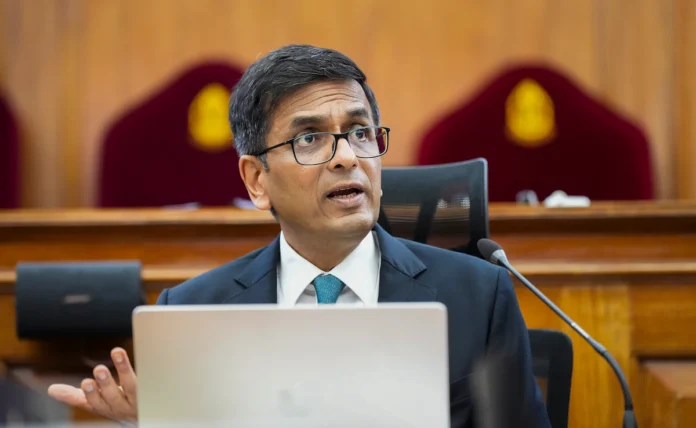Chief Justice Dhananjaya Y. Chandrachud, who assumed office as the 50th Chief Justice of India (CJI) in November 2022, has left a significant mark on the Indian judiciary through his judicial philosophy, landmark rulings, and the broader socio-political implications of his judgments. His legacy, while still unfolding, is already characterized by a mixed reputation, celebrated by some for its progressive outlook and criticized by others for perceived judicial activism. Here’s a look at the mixed legacy of CJI D.Y. Chandrachud:
1. Progressive Judgments and Social Reform:
- a. Right to Privacy (2017)
Prior to his tenure as CJI, as a judge in the Supreme Court, Justice Chandrachud was a key member of the bench that declared the Right to Privacy a fundamental right under the Constitution in 2017 (in the Puttaswamy case). This was a landmark decision with far-reaching implications for civil liberties, especially in the context of surveillance and data privacy. His articulate defense of individual rights placed him firmly in the camp of judicial activism aimed at expanding the scope of constitutional protections. - b. Gender Equality (2022-2023)
As CJI, Chandrachud continued to support progressive rulings in favor of gender equality. He authored judgments allowing women to enter the Sabarimala temple (2020) and has spoken in favor of women’s equal right to perform all religious duties. His push for reforms in family law, including advocating for equal property rights for daughters, has made him a prominent figure in advancing women’s rights within a legal framework traditionally influenced by patriarchal norms. - c. LGBTQIA+ Rights
Justice Chandrachud was part of the bench that decriminalized consensual same-sex relationships in the 2018 Navtej Singh Johar case. He has consistently defended the rights of the LGBTQIA+ community, making it clear that the right to love and live freely is part of the constitutional guarantee of equality. This reflects his progressive stance on human rights.
2. Judicial Independence and Judicial Activism:
- a. Upholding the Independence of Judiciary
Chandrachud has repeatedly defended the independence of the judiciary from political interference, a cornerstone of the Indian Constitution. For instance, his ruling in the 2022 challenge to the Central Government’s National Judicial Appointments Commission (NJAC) Act reflected his commitment to protecting the judicial appointment process from executive overreach. - b. Activism vs. Restraint
On the flip side, Justice Chandrachud’s tenure as CJI has often been associated with judicial activism. Critics argue that the judiciary, under his leadership, has taken an overly expansive view of its role, particularly in areas like environmental law, social welfare, and public interest litigation (PIL). While his decisions have been lauded by many, especially those advocating for human rights, others claim that some of his rulings reflect an unwarranted overreach into matters better left to the legislature or executive, leading to concerns about the “court-driven” nature of social reforms.
3. Judgments on Key Issues of Governance
- a. Electoral and Political Reforms
Chandrachud has shown a nuanced approach in his rulings related to elections and political reforms. His judgment in the 2022 matter related to electoral bonds, which called for more transparency in political donations, was an important step toward addressing concerns over the growing influence of money in politics. At the same time, his focus on judicial intervention in political matters has drawn criticism from those who believe the courts should exercise restraint in such areas, and that these are better addressed by elected representatives. - b. Administrative and Governance Reforms
The CJI has been an advocate for reforms in the administrative structures of the judiciary itself, calling for better infrastructure, transparency in appointments, and faster disposal of cases. His leadership has also been marked by a push to implement technological solutions to improve the efficiency of the justice system, especially in response to the massive backlog of cases in Indian courts.
4. Controversies and Criticisms:
- a. Handling of PILs and Political Questions
Some of the criticisms against Justice Chandrachud’s tenure have come from those who argue that he has been too willing to entertain Public Interest Litigations (PILs) that delve into political questions. This is seen as a potential undermining of the separation of powers, particularly when courts take on matters traditionally within the purview of elected representatives or government agencies. His strong involvement in issues like farmers’ protests, environmental regulations, and the handling of COVID-19 crises has raised concerns about judicial overreach. - b. Delayed Decisions in High-Profile Cases
Another criticism concerns the pace at which some high-profile cases have been resolved. Critics argue that while CJI Chandrachud has shown a willingness to take on politically sensitive issues, some cases have been delayed for extended periods, leaving important legal matters unresolved.
5. Public Perception and Legacy:
- a. Advocate for Human Rights
Justice Chandrachud’s progressive decisions, particularly on issues of human rights, equality, and justice for marginalized communities, have earned him a positive reputation among human rights activists, legal scholars, and civil society. His judicial philosophy is often seen as a counterbalance to conservative interpretations of the law, and his public statements have frequently emphasized the need to evolve in response to changing social and political landscapes. - b. Populist vs. Institutional Approach
One area where the mixed nature of his legacy is evident is in the balance between populist judicial activism and a more restrained institutional approach. His stance has often been aligned with progressive causes, which has made him extremely popular with sections of the Indian public, especially younger, urban, and more liberal communities. However, his critics argue that this populism sometimes clouds the institutional integrity of the judiciary and leads to unnecessary tensions between the branches of government.
Conclusion:
- The legacy of CJI D.Y. Chandrachud will likely continue to evolve as he remains in office and as his rulings and decisions continue to shape India’s legal landscape. On the one hand, his progressive judicial philosophy and commitment to protecting individual rights, social justice, and judicial independence have cemented his reputation as one of the more dynamic and reform-minded chief justices in recent history. On the other hand, his critics point to concerns about judicial overreach, delayed justice, and the complex relationship between the j


